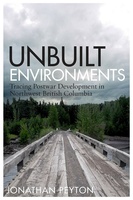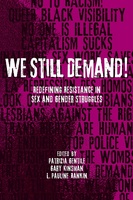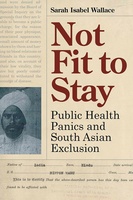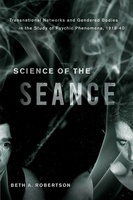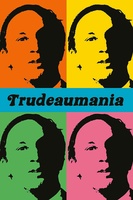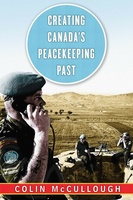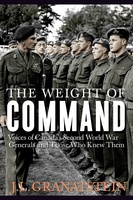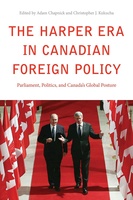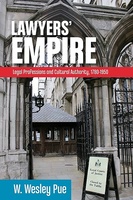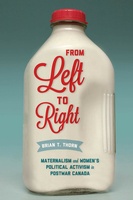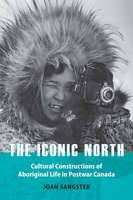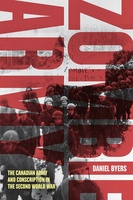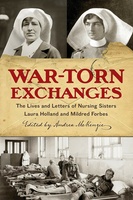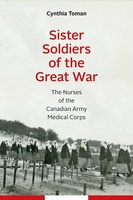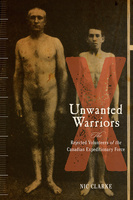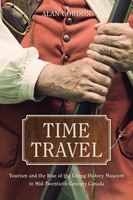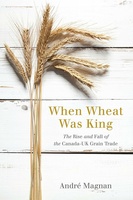Unbuilt Environments
Tracing Postwar Development in Northwest British Columbia
This book looks at the long-term social and environmental effects of imagined, abandoned, and failed resource-development schemes in northwest British Columbia.
We Still Demand!
Redefining Resistance in Sex and Gender Struggles
By challenging the erasure of radical histories, this book makes an invaluable contribution to remembering and rethinking Canadian sex and gender activism from the 1970s to the present.
Not Fit to Stay
Public Health Panics and South Asian Exclusion
Not Fit to Stay reveals how officials used panic about public health concerns as a basis for excluding early twentieth-century South Asian immigrants from entering Canada and the United States.
Science of the Seance
Transnational Networks and Gendered Bodies in the Study of Psychic Phenomena, 1918-40
In this enthralling study of the ethereal, the scientific, and the strange, Beth A. Robertson investigates the gendered world of the seance, a place where self-proclaimed “psychic researchers” laid claim to objectivity and where spiritual mediums and the spirits they channeled resisted their methods.
Trudeaumania
This book examines the origins, dynamics, and enduring significance of Trudeaumania, which swept Canada’s political and cultural landscape in the late 1960s.
Engaging the Line
How the Great War Shaped the Canada–US Border
Engaging the Line explores how the First World War forever changed the Canada–US border by examining reactions to increasingly strict security measures in six adjacent border communities.
Creating Canada’s Peacekeeping Past
Creating Canada’s Peacekeeping Past delves into diverse representations of Canadian peacekeeping, including National Film Board documentaries, political rhetoric, and high school textbooks to show how peacekeeping became a symbol of Canadian national identity in both French and English Canada.
The Weight of Command
Voices of Canada’s Second World War Generals and Those Who Knew Them
The senior Canadian officers of the Second World War learned how to fight a war on the job; for all of them, the weight of command was a burden to be borne.
The Harper Era in Canadian Foreign Policy
Parliament, Politics, and Canada’s Global Posture
The first comprehensive analysis of Canadian foreign policy during the Harper era.
White Settler Reserve
New Iceland and the Colonization of the Canadian West
This innovative history of a reserve for Icelandic settlers connects the dots between immigration and Indigenous dispossession in western Canada.
Lawyers’ Empire
Legal Professions and Cultural Authority, 1780-1950
In approaching the history of the legal professions through the lens of cultural history, Wes Pue locates the legal profession within England and its empire, supplementing and disrupting established narratives of professionalism as proffered by lawyers and their critics.
From Left to Right
Maternalism and Women’s Political Activism in Postwar Canada
This fresh look at Canadian women’s political engagement during the Cold War reveals that whether they were on the “left” or “right” end of the political spectrum, women were motivated by similar concerns and the desire to forge a new vision for their nation.
The Iconic North
Cultural Constructions of Aboriginal Life in Postwar Canada
The Iconic North explores how the “modern” South crafted cultural images of a “primitive” North that reflected its own preconceived notions and social, political, and economic interests.
Zombie Army
The Canadian Army and Conscription in the Second World War
This book tells the story of more than 150,000 Canadians who were subjected to conscription during the Second World War, and how their experiences shaped and were shaped by the decisions of the generals and politicians who guided the country’s war effort.
War-Torn Exchanges
The Lives and Letters of Nursing Sisters Laura Holland and Mildred Forbes
This vivid portrait of female friendship follows two Canadian nursing sisters who endured the trauma and privations of the Great War.
Sister Soldiers of the Great War
The Nurses of the Canadian Army Medical Corps
Award-winning author Cynthia Toman brings to life the experiences of Canada’s first women soldiers – nursing sisters who served during the First World War.
Unwanted Warriors
Rejected Volunteers of the Canadian Expeditionary Force
This book uncovers the history of Canada’s first casualties of the Great War – men who tried to enlist, were deemed “unfit for service,” and then lived with shame, guilt, and ostracism.
Time Travel
Tourism and the Rise of the Living History Museum in Mid-Twentieth-Century Canada
This fascinating look at Canada’s living history museums – pioneer villages and old forts where actors recreate the past – shows how they reveal as much about Canadian post-war interests as they do about settler history.
Fragile Settlements
Aboriginal Peoples, Law, and Resistance in South-West Australia and Prairie Canada
Fragile Settlements compares the historical processes through which British colonial authority was asserted over Indigenous people in southwest Australia and prairie Canada from the 1830s to the early twentieth century.
When Wheat Was King
The Rise and Fall of the Canada-UK Grain Trade
By tracing the rise and controversial fall of the Canadian Wheat Board, Magnan reveals how trade, international relations, and food politics have influenced the grain industry in prairie Canada, the UK, and around the world.

